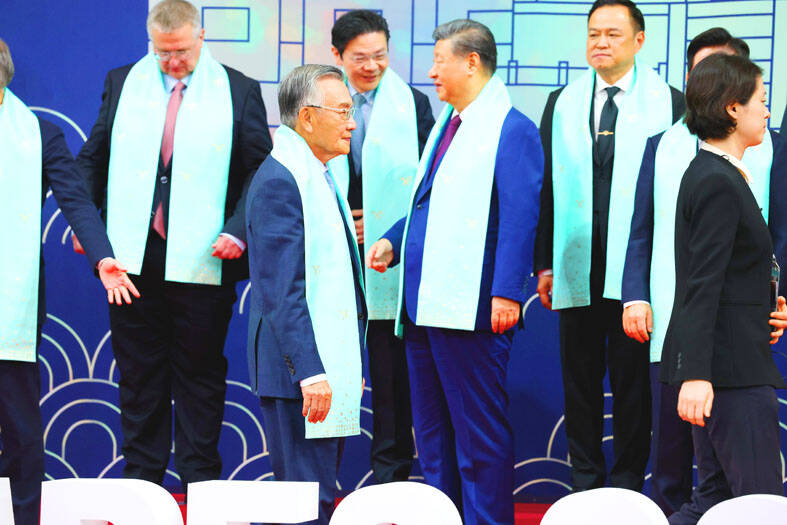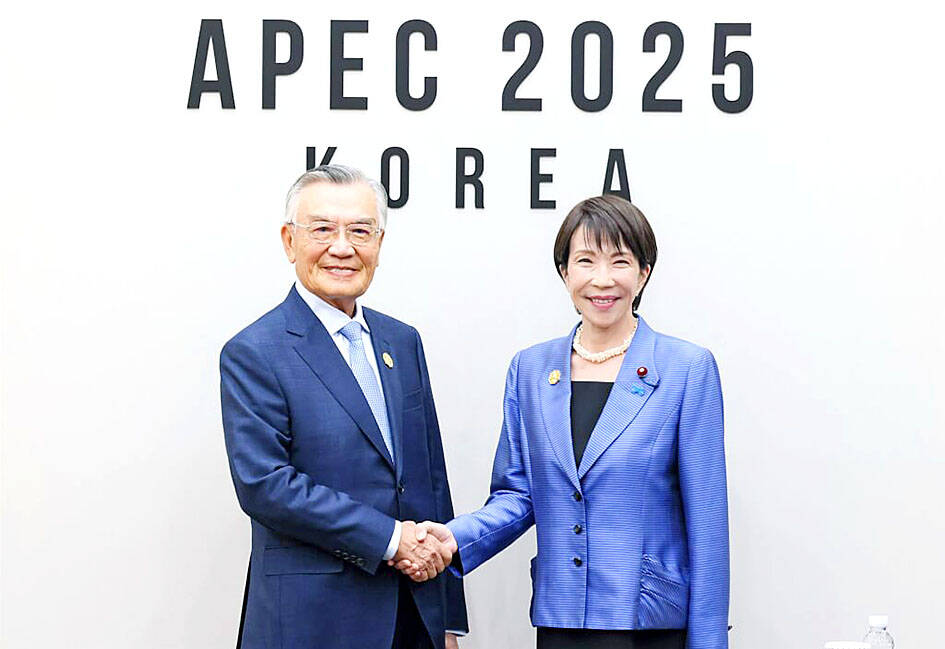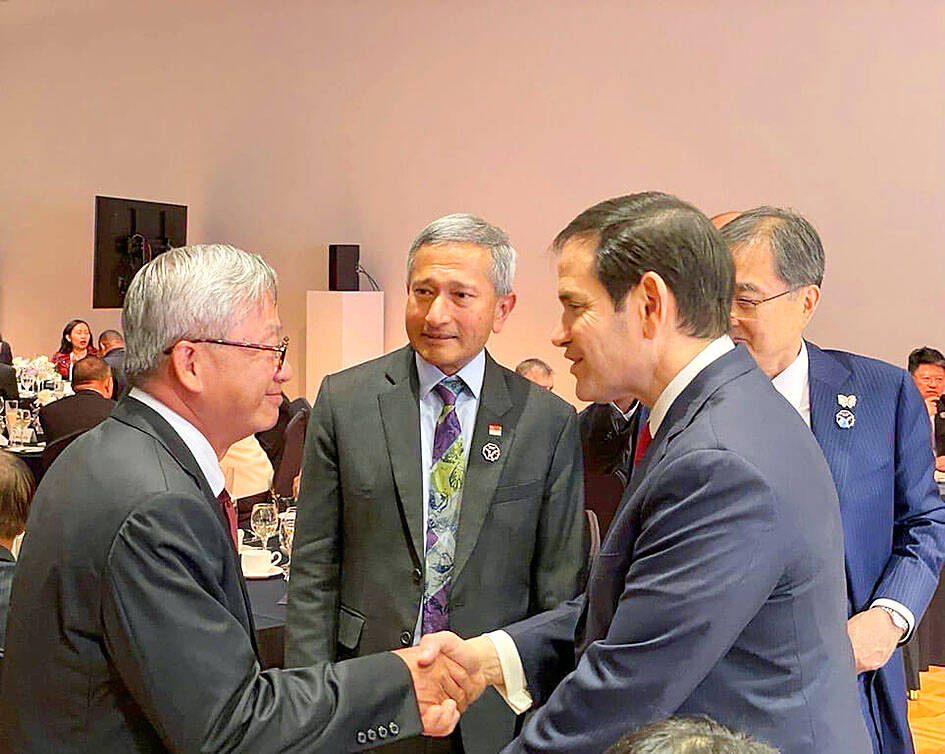Taiwan’s representative to the APEC summit, Lin Hsin-i (林信義), yesterday said that he and US Secretary of the Treasury Scott Bessent discussed supply chains and semiconductors during a meeting on the sidelines of the event in Gyeongju, South Korea.
Taiwan’s exports to the US, except for semiconductors, are subject to a 20 percent tariff, although Taipei has been in talks to get the figure reduced.
Lin, a former economy minister, told reporters that the two discussed safe supply chains and tech cooperation during a 40-minute meeting, adding that Bessent was interested in hearing how Taiwan built its chip industry.

Photo courtesy of Taiwan’s media delegation to APEC
The two “had a very wide-ranging discussion, covering cooperation in technology, the security of supply chains and many other issues,” Lin said.
“He said: ‘I was really intrigued to hear how you built up your high-tech semiconductor cluster — how it developed and the history behind it.’ He listened with great interest,” Lin added.
However, the discussion with Bessent did not touch much on ongoing tariff negotiations, according to the delegation, which provided no updates on the bilateral talks.

Photo grab from x.com/takaichi_sanae
At a news conference summarizing his third APEC trip, Lin said that Taiwan attracted more attention at the summit than two decades ago, especially regarding its achievements in artificial intelligence (AI).
Lin said he engaged in exchanges with representatives and leaders from more than 10 countries, including Japanese Prime Minister Sanae Takaichi, with further details to be announced later.
On Friday, Takaichi said she told Chinese President Xi Jinping (習近平) when they met on the sidelines of the summit that stability across the Taiwan Strait is key to the international community.

Photo courtesy of Taiwan delegation to the APEC summit
Minister of Foreign Affairs Lin Chia-lung (林佳龍) in a statement yesterday welcomed Takaichi’s concerns over cross-strait stability, praising the Japanese government for “speaking what should be said.”
However, Lin Hsin-i had no interactions with Xi during the two-day meeting, including when leaders and representatives posed for a group photograph yesterday.
He did not answer questions on whether he had talked to Xi.
Lin Hsin-i stood at the far right of the second row, while Xi stood near the center of the front row.
Asked to comment on the positions, Lin Hsin-i said the arrangement was natural, denying that President William Lai (賴清德) had instructed him to avoid contact with Xi or that South Korea deliberately placed him on the periphery.
“There were many people lining up,” he said.
At last year’s summit in Peru, Lin Hsin-yi greeted Xi with a wave, but they did not speak. Lin also met with then-US president Joe Biden in Lima.
This year’s APEC summit focused on AI applications and related issues, as well as drastic demographic changes — topics Lin Hsin-i said differed from the themes of economic cooperation and trade facilitation discussed at his first APEC meeting in Busan, South Korea, in 2005.
He cited Taiwan’s deployment of AI-assisted decisionmaking during Typhoon Gaemi last year, saying that the model significantly enhanced the precision and accuracy of storm monitoring and helped the government mitigate damage.
“I think I have done my best to fulfill the three missions assigned to me by President Lai,” he said, declining to commit to whether he would attend next year’s summit.
“It is a tough task. No one wants to do it,” he added, drawing laughter.
National Science and Technology Council Minister Wu Cheng-wen (吳誠文) met with US Secretary of State Marco Rubio at the summit on Wednesday, during which they exchanged “in-depth views on issues such as technology policy and AI development,” the Taiwanese delegation said yesterday.
China is to host next year’s APEC meet in Shenzhen.
China provided written assurances last year about the safety of participants in that summit, Ministry of Foreign Affairs official Jonathan Sun (孫儉元) told a news conference.
Taiwan has worked within the APEC framework “to ensure that China fulfils its commitments, so that the meetings can proceed smoothly and the safety of all participants is fully protected,” he added.

Conflict with Taiwan could leave China with “massive economic disruption, catastrophic military losses, significant social unrest, and devastating sanctions,” a US think tank said in a report released on Monday. The German Marshall Fund released a report titled If China Attacks Taiwan: The Consequences for China of “Minor Conflict” and “Major War” Scenarios. The report details the “massive” economic, military, social and international costs to China in the event of a minor conflict or major war with Taiwan, estimating that the Chinese People’s Liberation Army (PLA) could sustain losses of more than half of its active-duty ground forces, including 100,000 troops. Understanding Chinese

The Ministry of Foreign Affairs (MOFA) yesterday said it is closely monitoring developments in Venezuela, and would continue to cooperate with democratic allies and work together for regional and global security, stability, and prosperity. The remarks came after the US on Saturday launched a series of airstrikes in Venezuela and kidnapped Venezuelan President Nicolas Maduro, who was later flown to New York along with his wife. The pair face US charges related to drug trafficking and alleged cooperation with gangs designated as terrorist organizations. Maduro has denied the allegations. The ministry said that it is closely monitoring the political and economic situation

UNRELENTING: China attempted cyberattacks on Taiwan’s critical infrastructure 2.63 million times per day last year, up from 1.23 million in 2023, the NSB said China’s cyberarmy has long engaged in cyberattacks against Taiwan’s critical infrastructure, employing diverse and evolving tactics, the National Security Bureau (NSB) said yesterday, adding that cyberattacks on critical energy infrastructure last year increased 10-fold compared with the previous year. The NSB yesterday released a report titled Analysis on China’s Cyber Threats to Taiwan’s Critical Infrastructure in 2025, outlining the number of cyberattacks, major tactics and hacker groups. Taiwan’s national intelligence community identified a large number of cybersecurity incidents last year, the bureau said in a statement. China’s cyberarmy last year launched an average of 2.63 million intrusion attempts per day targeting Taiwan’s critical

‘SLICING METHOD’: In the event of a blockade, the China Coast Guard would intercept Taiwanese ships while its navy would seek to deter foreign intervention China’s military drills around Taiwan this week signaled potential strategies to cut the nation off from energy supplies and foreign military assistance, a US think tank report said. The Chinese People’s Liberation Army (PLA) conducted what it called “Justice Mission 2025” exercises from Monday to Tuesday in five maritime zones and airspace around Taiwan, calling them a warning to “Taiwanese independence” forces. In a report released on Wednesday, the Institute for the Study of War said the exercises effectively simulated blocking shipping routes to major port cities, including Kaohsiung, Keelung and Hualien. Taiwan would be highly vulnerable under such a blockade, because it